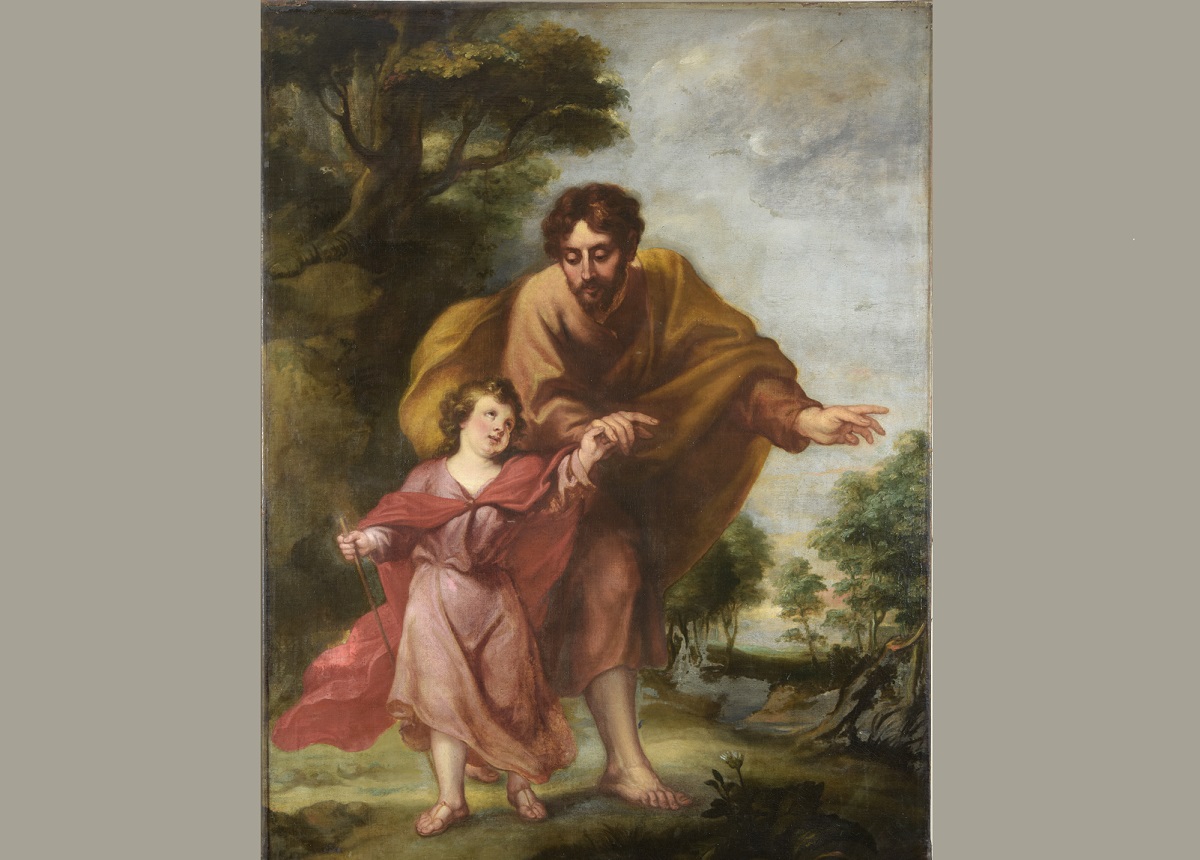Photo by Belozerov Mikhail – Own work, CC BY-SA 4.0
By Vir Christi
The world today demands that we use the loudest celebrities and political figures as role models. The implication is that the more noise one makes, the more insightful that person is. In the person of St. Joseph, the Church has a beautiful contradiction to the boastful nature of much of society. Strong, quiet, and gentle, Joseph stands out as a model that all people—men and women alike—can and should strive to follow.
What Makes Joseph Special?
When we think of Joseph as the foster father of Jesus, we’re inclined to think him unimportant. Because he isn’t Jesus’ biological father, people tend to view him as a secondary character in the life of Christ. However, God Himself didn’t see Joseph that way.
The Gospel of Matthew emphasizes the importance of the role of Joseph in two distinct places. The first is in the genealogy: Matthew clearly identifies that Jesus being descended from David is accomplished through St. Joseph (Matthew 1:1-12). Joseph’s incorporation into the genealogy tree seems technical when we’re reading it, but it’s hugely important: Joseph is giving Jesus the legitimacy of being the Messiah.
The other place where Matthew distinctly identifies Joseph’s importance is after Joseph finds out Mary is pregnant. There has been heated debate among Biblical scholars about Joseph’s plans to “divorce Mary quietly,” but an opinion gaining significant traction in recent years is sometimes called the “Reverence Theory” (see Father Donald Calloway’s book, Consecration to St. Joseph in the chapter “Joseph Most Just”). Father Calloway explains that Joseph was a Jew who knew his Torah. He knew that the Messiah was to be born of a virgin. When he found out Mary was pregnant, he knew it wasn’t by him, so he concluded that this was the long-awaited Messiah. He felt himself unworthy, and so he decided to divorce Mary. When the angel appeared to Joseph and encouraged him, he said that Mary “will bear a son, and you shall call His Name Jesus, for He will save His people from their sins” (Matthew 1:18-25). Ancient readers would have understood that naming a thing meant claiming ownership or authority over it. God gave Joseph the power to name the child, which meant that He was giving Joseph paternal custody over Jesus in almost every sense of the word.
Joseph’s Role in the Holy Family
Jesus spent thirty years in that little home at Nazareth; we know that Joseph was with Jesus for at least twelve of those years. Jesus’ human nature would have had habits formed by mirroring his father’s behavior, and Jesus learned the trade of carpentry from St. Joseph. A priest made an interesting point to me about just how significant Jesus learning that trade from Joseph was for His ministry. Carpenters in that time would have had to cut down the trees, and then haul the logs—which would have been of significant size—back to their workshop before they could begin crafting them. In showing Jesus how to carry the beams back to the workshop, Joseph was quietly teaching Jesus both the physical strength and moral perseverance His humanity would need on the road to Calvary. That instruction is also a lesson to all of us: God encounters us in honest labor, and such things are not beneath us as believers.
Another point to consider: Joseph’s life ceased to be his own when he agreed to take Mary into his home. He was tasked with raising Jesus, who was not his biological child, and made huge sacrifices on behalf of his family. He is third in the order of grace in the Holy Family, which means that he is consistently overshadowed. How many of us would be willing to accept that status, if God upended our lives and asked that sacrifice of us? How many of us would be willing to fade into the background for the sake of something greater?
Why Be Devoted to St. Joseph?
In Eucharistic Adoration, we acknowledge that Jesus is Truly Present and contemplate that Presence. If that’s true, imagine how many graces Jesus would have conferred on Joseph in the time spent together in the home at Nazareth! Joseph would have taught Jesus many lessons, but how often Joseph must have reflected with quiet wonder on all he heard Jesus and Mary say?
There is never a bad time to have a devotion to St. Joseph! The catastrophe that is modern society further emphasizes this fact. Many of St. Joseph’s admirable traits are polar opposites of the “virtues” that society advocates, which further underscores why Joesph is an excellent model of faith.
The Fourth Commandment tells us that we must honor our parents. We honor Mary because she is the Mother of God. In Luke’s Gospel, when Mary and Joseph find Jesus in the Temple, Mary says to Jesus, “Your father and I have been looking for you anxiously” (Luke 2:48). Jesus doesn’t contradict her and say, “Joseph isn’t My father!” He points to His Divine Father, but He never suggests that Joseph doesn’t have a right to filial obedience from Him. In fact, after the events at the temple, Luke says that Jesus went back to Nazareth and obeyed both Mary and Joseph in everything.
Such a powerful figure in the life of Jesus surely can be a powerful force in ours. If Jesus listens to His Mother, then He’ll surely listen to the intercession of the man God chose to be His earthly father. Joseph gives us an example of quiet, steady fidelity to family that everyone should emulate. He obeyed God, even when he didn’t understand or when the task God had given him meant encountering great hardship. He courageously led the Holy Family into Egypt to flee Herod, abandoning his business and everything else to protect his family.
When you read through the Gospels, keep an eye out for the mentions of St. Joseph’s quiet deeds. If you want to embrace St. Joseph as a spiritual father and emulate his virtues, read Father Don Calloway’s book about the consecration to St. Joseph.
Just as Jesus and Mary earnestly desire relationships with each of us, so too does St. Joseph. Just as Jesus and Mary can powerfully deliver us from spiritual enemies, so too can St. Joseph. Most importantly, remember: you don’t have to do extraordinary things to be holy. Be extraordinary in your pursuit of fulfilling the ordinary.
St. Joseph, pray for us!

Vir Christi
Vir’s heart has been on fire for the Church from day one, and he dreams of the day when Constantinople will be a city again. He has a competitive drive satiated by sports and board games, but is also just as happy to sit down and read a good book for hours on end.






0 Comments